|
|
|
Sort Order |
|
|
|
Items / Page
|
|
|
|
|
|
|
| Srl | Item |
| 1 |
ID:
088088
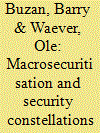

|
|
|
|
|
| Publication |
2009.
|
| Summary/Abstract |
The Copenhagen school's theory of securitisation has mainly focused on the middle level of world politics in which collective political units, often but not always states, construct relationships of amity or enmity with each other. Its argument has been that this middle level would be the most active both because of the facility with which collective political units can construct each other as threats, and the difficulty of finding audiences for the kinds of securitisations and referent objects that are available at the individual and system levels. This article focuses on the gap between the middle and system levels, and asks whether there is not more of substance there than the existing Copenhagen school analyses suggests. It revisits the under-discussed concept of security constellations in Copenhagen school theory, and adds to it the idea of macrosecuritisations as ways of getting an analytical grip on what happens above the middle level. It then suggests how applying these concepts adds not just a missing sense of scale, but also a useful insight into underlying political logics, to how one understands the patterns of securitisation historical, and contemporary.
|
|
|
|
|
|
|
|
|
|
|
|
|
|
|
|
| 2 |
ID:
109597
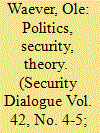

|
|
|
|
|
| Publication |
2011.
|
| Summary/Abstract |
This article outlines three ways of analysing the 'politics of securitization', emphasizing an often-overlooked form of politics practised through theory design. The structure and nature of a theory can have systematic political implications. Analysis of this 'politics of securitization' is distinct from both the study of political practices of securitization and explorations of competing concepts of politics among security theories. It means tracking what kinds of analysis the theory can produce and whether such analysis systematically impacts real-life political struggles. Securitization theory is found to 'act politically' through three structural features that systematically shape the political effects of using the theory. The article further discusses - on the basis of the preceding articles in the special issue - three emerging debates around securitization theory: ethics, transformations and post-Western analyses. The article finally suggests one possible way forward for securitization theory: a route built on first clarifying its concept of theory, then specifying more clearly the place of political theory and causal mechanisms in different parts of the analysis. The politics of securitization accordingly becomes sharpened. Instead of deducing the political quality of the theory from various empirical statements by its proponents, this approach zooms in on the very core of the theory: how does it structurally condition work done with it in systematically political ways?
|
|
|
|
|
|
|
|
|
|
|
|
|
|
|
|
| 3 |
ID:
079806


|
|
|
|
|
| Publication |
Cambridge, Cambridge University Press, 2003.
|
| Description |
xxiv, 564p.
|
| Series |
Cambridge studies in international relations; 91
|
| Standard Number |
9780521891110
|
|
|
|
|
|
|
|
|
|
|
|
Copies: C:1/I:0,R:0,Q:0
Circulation
| Accession# | Call# | Current Location | Status | Policy | Location |
| 052923 | 327.116/BUZ 052923 | Main | On Shelf | General | |
|
|
|
|
| 4 |
ID:
001430


|
|
|
|
|
| Publication |
Boulder, Lynne Rienner, 1998.
|
| Description |
xx, 239p.
|
| Standard Number |
155587603X
|
|
|
|
|
|
|
|
|
|
|
|
Copies: C:1/I:0,R:0,Q:0
Circulation
| Accession# | Call# | Current Location | Status | Policy | Location |
| 040952 | 355.03/BUZ 040952 | Main | On Shelf | General | |
|
|
|
|
| 5 |
ID:
138087
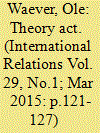

|
|
|
|
|
| Summary/Abstract |
One of the great appeals of securitization theory, and a major reason for its success, has been its usefulness as a tool for empirical research: an analytic framework capable of practical application. However, the development of securitization has raised several criticisms, the most important of which concern the nature of securitization theory. In fact, the appropriate methods, the research puzzles and type of evidence accepted all derive to a great extent from the kind of theory scholars bequeath their faith to. This Forum addresses the following questions: What type of theory (if any) is securitization? How many kinds of theories of securitization do we have? How can the differences between theories of securitization be drawn? What is the status of exceptionalism within securitization theories, and what difference does it make to their understandings of the relationship between security and politics? Finally, if securitization commands that leaders act now before it is too late, what status has temporality therein? Is temporality enabling securitization to absorb risk analysis or does it expose its inherent theoretical limits?
|
|
|
|
|
|
|
|
|
|
|
|
|
|
|
|
| 6 |
ID:
101485
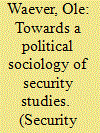

|
|
|
|
|
| Publication |
2010.
|
| Summary/Abstract |
Endowed now with a convincing history of itself, security studies needs a sociological analysis of its workings. The 'post-Kuhnian sociology of science' in the Buzan & Hansen (2009) volume is too sociologically thin and offers a disembodied history of ideas, not a sociology of flesh-and-blood scholars. This article suggests how a sociology of security studies can be strung between the two poles of a sociology of international relations and theories of expertise. Special attention must be paid to the role of 'security theory' for policy analysis, as well as the variation over time and geographically in the institutional chains connecting academe and policy, especially the changing nature of think-tanks. The centre of analysis should be networks of scholars manoeuvring these cross-pressures and making research and other career choices. Through its focus on form, this approach can explain dominant styles of scholarship in the USA and Europe as ways of meeting contrasting demands from academic institutions and policy relevance. The article ends with an assessment of the prospects for security studies.
|
|
|
|
|
|
|
|
|
|
|
|
|
|
|
|
| 7 |
ID:
129445
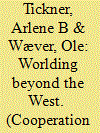

|
|
|
|
|
| Publication |
2014.
|
| Summary/Abstract |
Post-colonial scholarship, with its origins in studies of the long-term literary and more generally cultural effects of nineteenth-century European imperialism, made a relatively late entry into International Relations (IR). By 2007, though, post-colonialism was considered sufficiently important to be covered in an introductory textbook on International Relations Theories (Grovogui, 2007), and in recent years post-colonial approaches have made themselves felt in a number of reformulations of the tasks and future of the discipline (for example Agathangelou and Ling, 2009; Chan, 2010; Nayak and Selbin, 2010; Shilliam, 2011). Self-reflexive studies of the history and sociology of IR as a knowledgeproducing academic practice, or what Henrik Breitenbauch brackets together as 'meta- IR', have a rather longer history but received a boost in the late 1990s with the appearance of some major contributions that continue to shape debates in the field (see Hoffmann, 1977 for the influential and much-cited argument that IR has been an 'American social science', and subsequently Schmidt, 1998; Wæver, 1998).
|
|
|
|
|
|
|
|
|
|
|
|
|
|
|
|
|
|
|
|
|